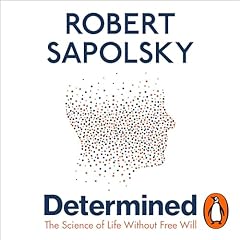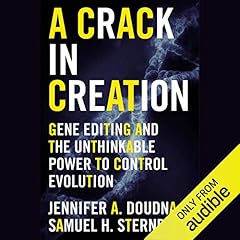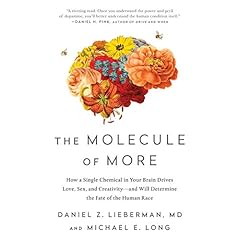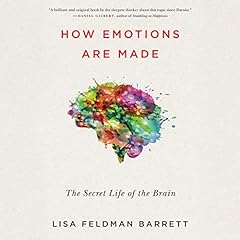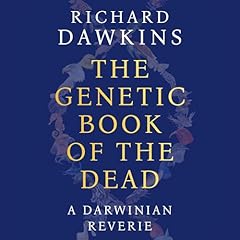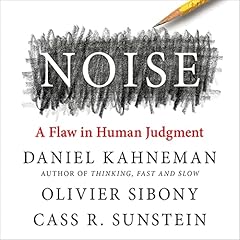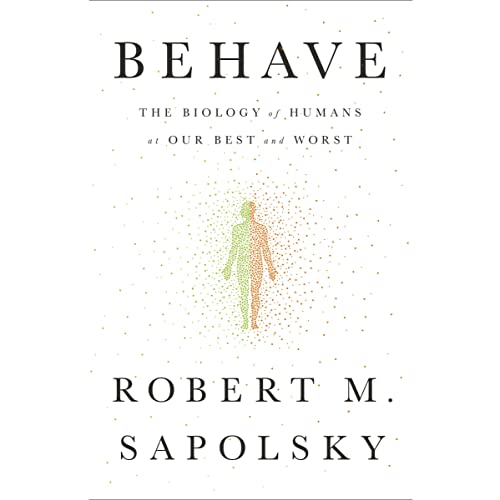
Behave
The Biology of Humans at Our Best and Worst
Artikel konnten nicht hinzugefügt werden
Der Titel konnte nicht zum Warenkorb hinzugefügt werden.
Der Titel konnte nicht zum Merkzettel hinzugefügt werden.
„Von Wunschzettel entfernen“ fehlgeschlagen.
„Podcast folgen“ fehlgeschlagen
„Podcast nicht mehr folgen“ fehlgeschlagen
0,00 € im Probezeitraum
Für 42,95 € kaufen
Sie haben kein Standardzahlungsmittel hinterlegt
Es tut uns leid, das von Ihnen gewählte Produkt kann leider nicht mit dem gewählten Zahlungsmittel bestellt werden.
-
Gesprochen von:
-
Michael Goldstrom
-
Von:
-
Robert Sapolsky
Über diesen Titel
The New York Times best seller.
From the celebrated neurobiologist and primatologist, a landmark, genre-defining examination of human behavior, both good and bad, and an answer to the question: Why do we do the things we do?
Sapolsky's storytelling concept is delightful but it also has a powerful intrinsic logic: He starts by looking at the factors that bear on a person's reaction in the precise moment a behavior occurs, and then hops back in time from there, in stages, ultimately ending up at the deep history of our species and its evolutionary legacy.
And so the first category of explanation is the neurobiological one. A behavior occurs - whether an example of humans at our best, worst, or somewhere in between. What went on in a person's brain a second before the behavior happened? Then Sapolsky pulls out to a slightly larger field of vision, a little earlier in time: What sight, sound, or smell caused the nervous system to produce that behavior? And then, what hormones acted hours to days earlier to change how responsive that individual is to the stimuli that triggered the nervous system? By now he has increased our field of vision so that we are thinking about neurobiology and the sensory world of our environment and endocrinology in trying to explain what happened.
Sapolsky keeps going: How was that behavior influenced by structural changes in the nervous system over the preceding months, by that person's adolescence, childhood, fetal life, and then back to his or her genetic makeup? Finally, he expands the view to encompass factors larger than one individual. How did culture shape that individual's group, what ecological factors millennia old formed that culture? And on and on, back to evolutionary factors millions of years old.
The result is one of the most dazzling tours d'horizon of the science of human behavior ever attempted, a majestic synthesis that harvests cutting-edge research across a range of disciplines to provide a subtle and nuanced perspective on why we ultimately do the things we do...for good and for ill. Sapolsky builds on this understanding to wrestle with some of our deepest and thorniest questions relating to tribalism and xenophobia, hierarchy and competition, morality and free will, and war and peace. Wise, humane, often very funny, Behave is a towering achievement, powerfully humanizing, and downright heroic in its own right.
©2017 Robert M. Sapolsky (P)2017 Penguin AudioKritikerstimmen
One of The Washington Post's 10 Best Books of 2017
"It has my vote for science book of the year.” (Parul Sehgal, The New York Times)
“It’s no exaggeration to say that Behave is one of the best nonfiction books I’ve ever read.” (David P. Barash, The Wall Street Journal)
Das sagen andere Hörer zu Behave
Nur Nutzer, die den Titel gehört haben, können Rezensionen abgeben.Rezensionen - mit Klick auf einen der beiden Reiter können Sie die Quelle der Rezensionen bestimmen.
-
Gesamt5 out of 5 stars
-
Sprecher5 out of 5 stars
-
Geschichte5 out of 5 stars
- Paul Leitner
- 28.01.2019
Tough read but fascinating content delivered in an entertaining way
This is definitely a fascinating read. Very content dense and ambitious in its' scope it is still entertaining - owing to both the author's choice of words and the speaker's deliver.
I specifically liked: the fact that the author seems to be aware of his own biases and points them out.
Avoiding cliches and going into great nuance.
Lots of references to other great books that I've either read with great interest or which ended up on my top-read list.
And finally the structure of the book (going from the occurrence of a behavior backwards through the influences from prior seconds to minutes to days to lifetimes to evolution.
Great read!
Ein Fehler ist aufgetreten. Bitte versuche es in ein paar Minuten noch einmal.
Sie haben diese Rezension bewertet.
Wir haben Ihre Meldung erhalten und werden die Rezension prüfen.
-
Gesamt5 out of 5 stars
-
Sprecher5 out of 5 stars
-
Geschichte5 out of 5 stars
- Mary Astelrin
- 18.05.2020
Fascinating!
What a great book! Bit hard to follow if you're very tired or not that proficient in English, but still very much worth the concentration! Changed my worldview a bit!
Ein Fehler ist aufgetreten. Bitte versuche es in ein paar Minuten noch einmal.
Sie haben diese Rezension bewertet.
Wir haben Ihre Meldung erhalten und werden die Rezension prüfen.
-
Gesamt4 out of 5 stars
-
Sprecher5 out of 5 stars
-
Geschichte4 out of 5 stars
- Henrik
- 21.08.2017
Fascinating subject, but biased reasoning
Würden Sie Behave noch mal anhören? Warum?
I wouldn't want to listen to this book ever again. I've listen to it twice, attentively, because I believe you should also listen closely to people with whom you disagree, because maybe they are right on some or all points and you are wrong. The subject of the book is too important to be wrong about, so I really gave it a second chance, because it went against much of what I believe to be true about humans and human nature. Or rather Sapolsky doesn't go against it, he acknowledges, discusses much of it, yet he always twists the insights, questions them or turns them in a direction, reasons against them in ways that doesn't really seem convincing, but seems - again and again - guided by a biased reasoning. The reason for this biased and self deceptive reasoning seem to be his strong leftist leaning and maybe also an upbringing in a quaker family, and maybe also a very empathic mindset, that sometimes gets carried away in sentimental accolades of people he finds admirable.
I will not discuss or comment on his chapters on what the function of different brain regions are, nor on what the synapses do etc. It may be all true or wrong. I don't know. It is all very interesting, yet it also seems as a science in its infancy, where results are incomplete, provisional and might be revised in the future - but maybe I'm doing that part injustice and I just don't get it a clear picture, all though the picture was there in the book.
Sapolsky's preferred adjective for books or writers with whom he - and the left, one thinks - disagrees is 'controversial'.
One such book is Judith Harris' The Nuture Assumption, that he terms 'controversial'. I think a better word would be 'classic'. After having heard his book twice, I do wonder, if there isn't a tacit admission to Judith Harris' main point, that parenting matters little or nothing in shaping our behaviour outside the home, by the fact that he himself doesn't come with any examples on the importance of parenting. There is only one place, where he speaks about heroism - 'heroism feels and never reasons' is a nice quote from Emerson in that chapter - that he seems to suggest, that this heroism is not something with which you are innately born or have a propensity towards, no he seems to believe that people act heroic because this heroism was inculcated in them through their upbringing.
He also has a discussion of Steven Pinker's book The Better Angels of our Nature, that he does call monumental, but in some way he seems to be more hinting at its physical size, as to the content and argument of the book. I must say, that I by far prefer Steven Pinker's book where he convincingly paints a picture of a past that was extremely violent, and he also has some clearly stated ideas about why our world has become less violent, and how it might be even less violent. Sapolsky, though, has a longer discussion about, and refers to newer studies, that seems to show that Pinker, and some other author, whom I haven't had the pleasure of reading, have cherry picked their data, so that hunter-gather-societies seem a lot more aggressive than they really were. He also seems to redefine some of the hunter-gathers in the data - maybe also the Yanomamö, whom Chagnon studied in the sixties and seventies and whose book about them had the title The Yanomamö - the fierce people - a book that seems to have inspired Steven Pinker - so that he says that they are not real hunter gathers. Somehow you are left with the impression, that they have been corrupted by modernity, outsiders, so that the question about whether indigenous people were living in a Hobbesian world, where aggressive males might have done better than others in the game of reproduction or in a Rousseaunian paradise of nobel savages, there it probably was the latter. I'm not convinced - his argumentation seems so clouded by his leftist leaning. I think of Robert Thrivers book about selfdeception, and think that he is doing this full time here.
Chagnon is also called 'controversial', but when you read his book, then it has the ring of truth to it. The hunter-gathers in his book are not theoretical constructs or test persons (usually psychology students themselves) in psychology studies, but real people.
In his discussion about terms like herited and heritability, he does try to do the subject justice, and he even talks about Thomas Bouchard's twin studies as 'most wonderful', and he does say that they are more or less accurate, the correlation numbers for heritability of traits. Yet - he comes up with an example, where he talks about women wearing earrings in the fifties, and that these twin studies would show a perfect correlation between genes and trait, because only girls would be wearing earrings at that time, but earrings are not due to genetics, they have everything to do with culture, environment, context. I found it a manipulative and deceptive example. He doesn't say, that the twin studies are wrong, yet he leaves you, with this example with the impression, that maybe this thing about heritability is a bit quirky. One agenda of his book seems to be to give as little influence to genes and genomes as possible, and as much influence to context. That is his credo: context, context, context. Genes always work in a context, actually my impression is almost that he thinks that context shapes the expression of the genes, do I dare to say determines the expression of the genes. There is one example, that I just can't get my head around: He states that when a woman begins to lactate, it is not due to her genes/genome, it's due to the context, the present of a baby. I don't understand how he can say that! Being a man, I could sit with a baby for ever, and I would not begin to produce milk. Becoming a father, seeing my children grow in the womb of my wife, her giving birth etc. is really the time, where I felt, that her and my behaviour were shaped and guided by our nature, you almost felt like a bystander, you were looking at a nature that could not be stopped.
The project of his book seems to be to give as much influence to context, environment that he possibly can. I do actually like his phrase about genes in a context, but where he seems to suggest that we can 'freely' shape our context, the context might just be way beyond our control, or the context might just be the result of our own genes or those of others. His hope seems to be that we through controlling our mind - eg. us-them dichotomies - can make the world, our societies better. His list of suggestions for bypassing and controlling your us-them dichotomies are worth memorizing, but I do have quarrels about them. One is that stereotypes about others are not necessarily wrong - we make categorisations about ducks, and if it quacks like duck, and it walks like a duck, it probably is a duck. Categorisation and stereotypes can build, and research shows (according to Steven Pinker in The Blank Slate - the denial of human nature) that stereotypes often are correct (there are though exceptions where one should be suspicious of them, eg. when there is little or no contact with the group or in case of intergroup hostilities. And us-them dichotomy can build on a real difference, and not just on prejudice. Another is that it's great that you are able to weed out your own problematic us-them dichotomies, but what do you do, when you are the target of other people's dichotomies. I don't see how he answers to that. Furthermore I think the main lesson in the research into us-them dichotomies is, that they are ubiquitous, they cannot be turned of, they can change at a blink of an eye almost, so we should stay vigilant towards them at all times in ourselves, but - and this is what Sapolsky doesn't give a moments thought, we must also be vigilant towards how others are making us into repugnant, coldhearted, creedy thems.
I think, he doesn't give this much thought, because he does have a 'them'. As a person of the left, he does think that rich people, white men like himself (and myself) are the cause of most evil and injustice in the world.
I have come to prefer the suggestions of Steven Pinker, that we can thank much of our good lives, not so much to the exploitation of other people, but because we got a centralized power, that freed us from the Hobbesian Trap of our ancestors, there was a civilizing process, self control, as described by Elias, literacy, more trade with each other, the use of reason, and expanding moral circle. Sapolsky feels this all has a smack of 'we are a superior civilisation'. I must say that I find these ideas more challenging and true, and worth working for, than some of the 'angels' put forward by Sapolsky.
Sometimes I think that there are two personal anecdotes, that Sapolsky and Pinker gives about themselves, that works like two points of orientation to understand there take on human nature, and maybe even are two real defining moments and epiphanies for their thinking.
For Steven Pinker it's the strike of the Montreal Police back in the sixties or seventies, that left his Bakunin-inspired anarchism of his youth in tatters.
For Sapolsky I think it is his story about the Baboons who died of typhoid. It was only the most aggressive males who died, and this, according to him, changed the 'culture' of the baboon herd. They became way less aggressive, new male baboons who joined the group quickly refrained from their usual aggressive and stressed behaviour. It all seems to epitomize his message about context-dependent behaviour. In many ways it is hard to disagree, we human males are still aggressive as were our ancestors, but we are shaped by our modern context, where aggression is curbed and prohibited in so many ways. I do though think, that his example has some problems. First, and maybe this is doing him un- justice, but if you could say that a nasty subtext, or an implicit implication of his story, could be, that if all the aggressive males were to die - it wouldn't be such a bad thing for society. And yet all he seems to advocate is, that if only we change our culture, then .... I also have a second objection to this example: What on the longer term? Is it and Evolutionary Stable Strategy that the peaceful baboons have found, or could will it be turned around by events in a nor all to distant furture
Finally - he also uses a lot space discussing the penitentiary system, the reasons and un-reasons to punish etc. I'm extremely tired now, so I'll go to bed, but just say, that that part also left me unconvinced. He doesn't seem to consider or discuss punishment as having to do, and working as deterrents.
I'm really tired, so I'll end here.
Steven Pinnker's books: The Blank Slate - the denial of human nature; and The better Angels of our nature are both two tour-de-forces and extremely well-written.
I would recommend anyone having come so far, no one probably has, to read/listen to those books first.
Ein Fehler ist aufgetreten. Bitte versuche es in ein paar Minuten noch einmal.
Sie haben diese Rezension bewertet.
Wir haben Ihre Meldung erhalten und werden die Rezension prüfen.
18 Leute fanden das hilfreich
-
Gesamt4 out of 5 stars
-
Sprecher4 out of 5 stars
-
Geschichte4 out of 5 stars
- Sebastian Stüber
- 21.05.2020
Solid overview
Sapolsky gives a knowing and entertaining overview of the biological foundations of human behavior. He openly acknowledges his atheistic premises.
Ein Fehler ist aufgetreten. Bitte versuche es in ein paar Minuten noch einmal.
Sie haben diese Rezension bewertet.
Wir haben Ihre Meldung erhalten und werden die Rezension prüfen.
1 Person fand das hilfreich
-
Gesamt5 out of 5 stars
-
Sprecher5 out of 5 stars
-
Geschichte5 out of 5 stars
- M.W.
- 04.05.2018
life changing
altered profoundly my attitude towards and understanding of humans and life in general . Very well read.
Ein Fehler ist aufgetreten. Bitte versuche es in ein paar Minuten noch einmal.
Sie haben diese Rezension bewertet.
Wir haben Ihre Meldung erhalten und werden die Rezension prüfen.
-
Gesamt5 out of 5 stars
-
Sprecher5 out of 5 stars
-
Geschichte5 out of 5 stars
- Soren Hansen
- 13.08.2019
Complex and eye-opening!
If you survive the complexity and multitude of abbreviations of the first part of the book you will be rewarded with eye-opening revelations as the author arrives at his point in the latter part. Truly amazing!
Ein Fehler ist aufgetreten. Bitte versuche es in ein paar Minuten noch einmal.
Sie haben diese Rezension bewertet.
Wir haben Ihre Meldung erhalten und werden die Rezension prüfen.
-
Gesamt2 out of 5 stars
-
Sprecher1 out of 5 stars
-
Geschichte1 out of 5 stars
- Reimfloh
- 12.10.2018
Als Hörbuch zu komplex
Ich finde, dass "Behave" als Hörbuch äußerst anspruchsvoll ist. Als Buch stelle ich es mir leichter vor. Für mich hat es überhaupt nicht funktioniert. Es wurden in kurzer Zeit eine Menge Kürzel eingeführt die dann exzessiv verwendet wurden. Ich denke ein Kürzel, wenn man es visuell sieht lässt sich leichter einprägen als wenn man es nur hört. Zumindest für mich klang alles nach kuzer Zeit nach "PDPADPNeuroTRKLMDSP". Ich habe dann versucht Kapitel 2 zu überspringen, aber es baut scheinbar alles aufeinander auf. Zusätzlich kommt die englische Fachsprache erschwerend hinzu. Die Stimme des Sprechers hat mir auch gar nicht gefallen. Es gibt populärwissenschaftliche Bücher die bedeutend besser geschrieben sind und die man auch im Auto hören kann. Dieses hier gehört nicht dazu. Vielleicht ist das einfach so bei dem Thema, vielleicht könnte man es aber auch besser machen.
Ein Fehler ist aufgetreten. Bitte versuche es in ein paar Minuten noch einmal.
Sie haben diese Rezension bewertet.
Wir haben Ihre Meldung erhalten und werden die Rezension prüfen.
7 Leute fanden das hilfreich
-
Gesamt1 out of 5 stars
-
Sprecher5 out of 5 stars
-
Geschichte1 out of 5 stars
- Anonymer Hörer
- 22.03.2024
Fachlich mangelhaft.
Fachlich inkorrekte Darstellung.
Insbesondere bzgl. Nature versus Nurture Debatte unvollständig bzw. werden unkommentiert nicht reproduzierbare Studien und stark kritisierte Studien unhinterfragt übernommen.
Ein Fehler ist aufgetreten. Bitte versuche es in ein paar Minuten noch einmal.
Sie haben diese Rezension bewertet.
Wir haben Ihre Meldung erhalten und werden die Rezension prüfen.
-
Gesamt3 out of 5 stars
-
Sprecher5 out of 5 stars
-
Geschichte5 out of 5 stars
- Lily
- 12.03.2020
Book = TOP! Audiobook... Missing parts.
I am only halfway through the book, but I can already tell you, it is amazing, entertaining, insightful and very easy to understand. The author really made an effort to use a lot of examples and metaphers that make the readers understand, even if the reader is not used to scientific books. He also uses comedy and jokes to ease the tension.
The person who voiced the book is also incredible. So the Book itself is great the voice actor is great why did I only give 3 starts overall?
It's because there are 3 important things that I found very annoying about the audiobook.
First: There is no additional PDF with the sketches and pictures that are described in the book - you are hopelessly lost if you are not able to look at them while he is talking about a certain part in the brain.
I personally don't remember where "this" and "that" part of the brain is just because he explained it once. And it certainly doesn't mean I remember where that particular area in the brain is 1 hour later in the book.
That's why I also bought a copy of the book
Second: That is when I noticed that there is a part in the book after chapter one, where the author tells the readers that at the end are additionals chapters to help you understand what he is talking about and where he tells you to look that up before reading further in the book.
I am not at the end of the audiobook so I am not sure if this won't be read to the reader at the end but fact is, that it should have been read by the voice actor at the end of the chapter where the author mentions to look it up.
Third: There are also a lot of amazing footnotes with stories and explanations, which are also not read to the readers in the Audiobook, which is a shame.
I still recommend the audiobook because even though the author explains everything on a level where everyone should be able to understand, it is still a difficult topic so reading along while the audiobook is playing, is helping you taking in the meaning even better.
Also I am not a nativ English speaker and there are a lot of words i have never heard before so it is good to know how to pronounce them AND how to write them so I can look them up.
ALL in all I love this book and I am pretty sure I will read it more than once.
Ein Fehler ist aufgetreten. Bitte versuche es in ein paar Minuten noch einmal.
Sie haben diese Rezension bewertet.
Wir haben Ihre Meldung erhalten und werden die Rezension prüfen.
4 Leute fanden das hilfreich




